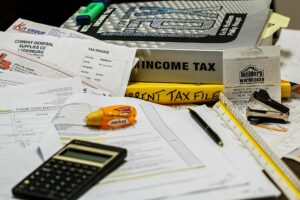Pension or Property
Before getting into this blog I want to clarify that I am not an anti-property advisor, quite the opposite. I believe property can have an important role to play in a clients portfolio as it can provide a nice stream of passive income.
However, on a regular basis I come into conversations with friends and potential clients over pensions and property and at the mere mention of a pension they pull the shutters down because they love property and the old saying ‘you can’t beat bricks and mortar’ takes over – however, they say this without looking at the facts.
When it comes to pensions and property I hear some of the following challenges (but not limited to), ‘I don’t need a pension, I’ve got property’, ‘Why would I invest in a pension when I have property investments?’, ‘Pensions? People lose them, i can’t lose my bricks and mortar!’
With this blog post I want to debunk some of the myths surrounding pensions and property and to anyone reading this who is anti-pension and pro-property, I ask you to at least take on board some of the following facts.

Tax Efficiency
Undeniable fact, no one likes paying tax and everyone loves (legal) tax-efficiency!
Personal contributions to a pension attract tax relief, let’s assume 40% for the higher rate tax payer. So, for every €1,000 invested in a pension the net cost to the investor is €600. For every €10,000 invested in a pension the net cost to the investor is €6,000. You’re reading that correctly, Revenue will actively and voluntarily pay you to invest in a pension!
The above is even before considering the possibilities for a company owner. If you are an owner of a company drawing a Schedule E income, your company can pay higher than personal limits to a pension plan on your behalf and you’re reducing your own personal tax bill (pension contribution as opposed to drawing it out as salary) and reducing your Corporation Tax bill – pension contributions from the company as your employer are tax deductible.
Compare that to buying a property – when you buy a property you pay that out of after-tax income. So assuming a rounded 50% tax rate, for a €1,000 per month mortgage payment we have to earn €2,000. If we want to buy a property at €200,000, the actual cost to us is €400,000.
Rental income, like salary is taxed heavily, income tax, USC, PRSI so again, approximately 50% tax.
Capital Gains Tax (CGT) on the gain at the sale of the property at 33%.
Compare income tax, USC & PRSI on your rental income and 33% Capital Gain Tax on the gain at sale versus the tax-free growth on a pension fund.
There is no comparison.

Growth
Pension funds depend on your risk profile, risk capacity and objectives and they will have some exposure to global equities. Equities consistently outperform every other asset class over time.
Over time – assuming an investor is 40, that’s a good 30-40 year investment term to enjoy the growth that’s generated by owning a part of some of the world’s biggest companies as part of your pension fund.
Whilst I wont get into detailed growth stats here (that can be a whole blog post), according to tradingeconomics.com, Irish Residential Property Prices have not yet reached the highs of late 2007/early 2008 whereas the MSCI World Equity Index (Gross TR) has returned approximately 235% since 1st January 2008.
A standard insured Balanced multi asset fund in Ireland has returned approximately 164% over the same period, compare that to a ‘leading’ Irish property fund over the same period which comes in at approximately 23%.
The pro-property and anti-pension investor won’t acknowledge this and expects that the property around the corner from them will outperform the growth of the world’s largest companies.
Additionally, when we think of our property returns, it’s normal to think of sale cost less acquisition cost and taxes as the net profit however generally speaking no consideration is given for the ongoing running costs we incur.

Liquidity
Ok, pre-retirement this is a dead heat as there is no liquidity in a pension fund before accessing the benefit however there is also no liquidity in a property. Unfortunately we cannot take a cornerstone or window sill and use it to pay for the weekly shopping.
In retirement the landscape for the pension changes, assuming that the pension investor invests in an Approved Retirement Fund (ARF) the ARF holder has access to withdrawals but still there is no immediate liquidity in a property.
Inconvenience
Owning and renting a property comes with the inconvenience & headaches of repair and maintenance (practicalities), repair and maintenance (costs), finding tenants, legal fee, management fees etc.
There’s also the possibility that if we have a good tenant, do we want to increase the rent in case they leave and we have to start again so is the anticipated rent growth really achievable?
Stack that up against a pension with no such inconvenience other than the psychological annoyance when market volatility can cause a temporary devaluation of the fund before it moves upwards again.
Diversification
A well recommended pension portfolio is diversified across thousands of different equities (stocks, companies) which are then spread over multiple different industries and geographical regions. Compare that to the bricks and mortar property in Ireland which is completely reliant on the Irish property market (i.e. no diversification).
See our investment philosophy here
Can we mix the two together?
Of course we can. We can use our pension funds to purchase a property subject to certain Revenue rules.
When using a pension fund to purchase a property we can enjoy the following tax efficiency:
- Tax relief on our pension contributions
- No income tax, USC or PRSI on rental income
- No Capital Gains Tax (CGT) on sale of the property
Therefore, property does make sense but for the property fans, there are much more tax efficient ways of doing it than purchasing it out of after-tax income.
The recent IORPS II ruling has made it that bit trickier for those of us with company pensions but we can still use a personal pension, PRSA or ARF in retirement to purchase a property.
What next?
I hope this blog given some food for thought over and has at least debunked some of the myths surrounding pension versus property.
If you’re a bricks and mortar type person I hope the information contained here has caused you to raise an eyebrow to say that pensions do have their advantages aligned with your own personal interests.
The tax efficiency alone a pension carries over a property nullifies any argument that a property investment is superior to a pension.
Who doesn’t enjoy tax efficiency? Your pension provides this and is the best tool for making sure you have enough money when you stop working.
If you would like to discuss the content, request a callback.
Otherwise give me a call on 086 0080 756 or email me francis@fortitudefp.ie.
We have over 30 articles we’ve written on various subjects and they can be accessed here, a wealth of free information.


Francis McTaggart CFP® SIA RPA QFA
These blog posts are intended for information purposes only and should not be interpreted as financial advice.
You should always engage the services of a fully qualified financial planner before entering any financial contract.
To discuss engaging the services of Fortitude Financial Planning please email us at info@fortitudefp.ie.
Fortitude Financial Planning Ltd will not be held responsible for any actions taken as a result of reading these blog posts.



 Production
Production